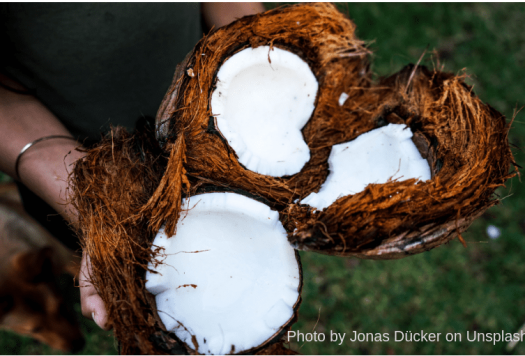By Christian Augusto Maino Vieytes, M.S. Candidate, Division of Nutritional Sciences, University of Illinois
Coconut Oil
Cooking with oil is a staple dietary custom across an expanse of cultures. The use of coconut oil as a mainstream cooking oil has garnered attention within the last decade and is often labeled a “functional food”. Many have advanced the idea that this plant-based oil is a healthier alternative to butter and other oils, but does the evidence back such claims?
Saturated Fat: Are They All Created Equal?
The evils of saturated fat have been well documented by academics and the news media. Consumption of saturated fat has been demonstrated to perpetuate cardiovascular disease by increasing levels of “bad” cholesterol, known in the scientific community as the LDL cholesterol level, at the expense of “good” cholesterol, HDL. If such a claim is true then we would expect consumption of coconut oil, which is comprised of up to 90% saturated fat, to deliver an egregious attack on your arteries. Moreover, proponents of coconut oil-use and wholesalers have claimed that the saturated fat profile of coconut oil is “healthier” than that found in animal products. Let’s take a look at what the science has to say.
The Science
Numerous studies have been carried out and arrived at the conclusion that incorporating coconut oil into the diet is associated with an increase in total cholesterol. This includes observed jumps in both “bad” (LDL) and “good” (HDL) cholesterol levels. Compared to other dietary sources of saturated fat, coconut oil was only surpassed in its LDL-raising capability by animal-derived butter. Sticking to a plant-derived oil such as safflower oil or olive oil, which unlike animal fat or coconut oil is abundant in unsaturated fats, was found to not be as damaging and has been suggested, by many studies, to have a profound LDL-lowering effect.
Plant sources tend to have a higher unsaturated fat content and provide additional nutritional benefits, such as packing vitamins and antioxidants. Coconut oil provides a rich source of antioxidant compounds called phenolics despite it being very high in saturated fat. However, the same class of beneficial compounds are found in other plant-oils such as virgin olive oil, which pack only miniscule amounts of saturated fat. The methods of oil extraction also significantly affect the levels of these compounds in the oil. Cold extraction methods (you might see this labeled “cold-pressed” on products at your local grocery store) tend to retain higher levels of these chemicals.
The Take-Home Message
The source of your dietary fat is very important. Plant oils tend to be substantially healthier than animal fats and can contribute to the prevention of cardiovascular disease, given that they boast lower amounts of saturated fat. However, as a general rule of thumb, it is always best to cut down on processed foods. Coconut oil and other plant-sourced oils are calorically-dense, refined, and processed products that are easy to overconsume since they have been taken out of the context of the whole food they originate from. Incorporating whole-food fat sources, such as avocados and nuts, is an easier approach for acquiring these essential plant-derived fats and nutrients without the propensity to overconsume them.
Bibliography
Amarasiri, W. A., and A. S. Dissanayake. “Coconut fats.” The Ceylon medical journal 51.2 (2006): 47-51.
Cox, C., et al. “Effects of dietary coconut oil, butter and safflower oil on plasma lipids, lipoproteins and lathosterol levels.” European journal of clinical nutrition 52.9 (1998): 650.
Denke, Margo A. “Dietary fats, fatty acids, and their effects on lipoproteins.” Current atherosclerosis reports 8.6 (2006): 466-471.
Eyres, Laurence, et al. “Coconut oil consumption and cardiovascular risk factors in humans.” Nutrition reviews 74.4 (2016): 267-280.
Harris, Margaret, Andrea Hutchins, and Lisa Fryda. “The impact of virgin coconut oil and high-oleic safflower oil on body composition, lipids, and inflammatory markers in postmenopausal women.” Journal of medicinal food 20.4 (2017): 345-351.
Marina, A. M., et al. “Antioxidant capacity and phenolic acids of virgin coconut oil.” International Journal of Food Sciences and Nutrition 60.sup2 (2009): 114-123.
Marina, A. M., YB Che Man, and I. Amin. “Virgin coconut oil: emerging functional food oil.” Trends in Food Science & Technology 20.10 (2009): 481-487
Owen, Robert W., et al. “Olive-oil consumption and health: the possible role of antioxidants.” The lancet oncology 1.2 (2000): 107-112.
Willett, Walter C., et al. “Mediterranean diet pyramid: a cultural model for healthy eating.” The American journal of clinical nutrition 61.6 (1995): 1402S-1406S.















